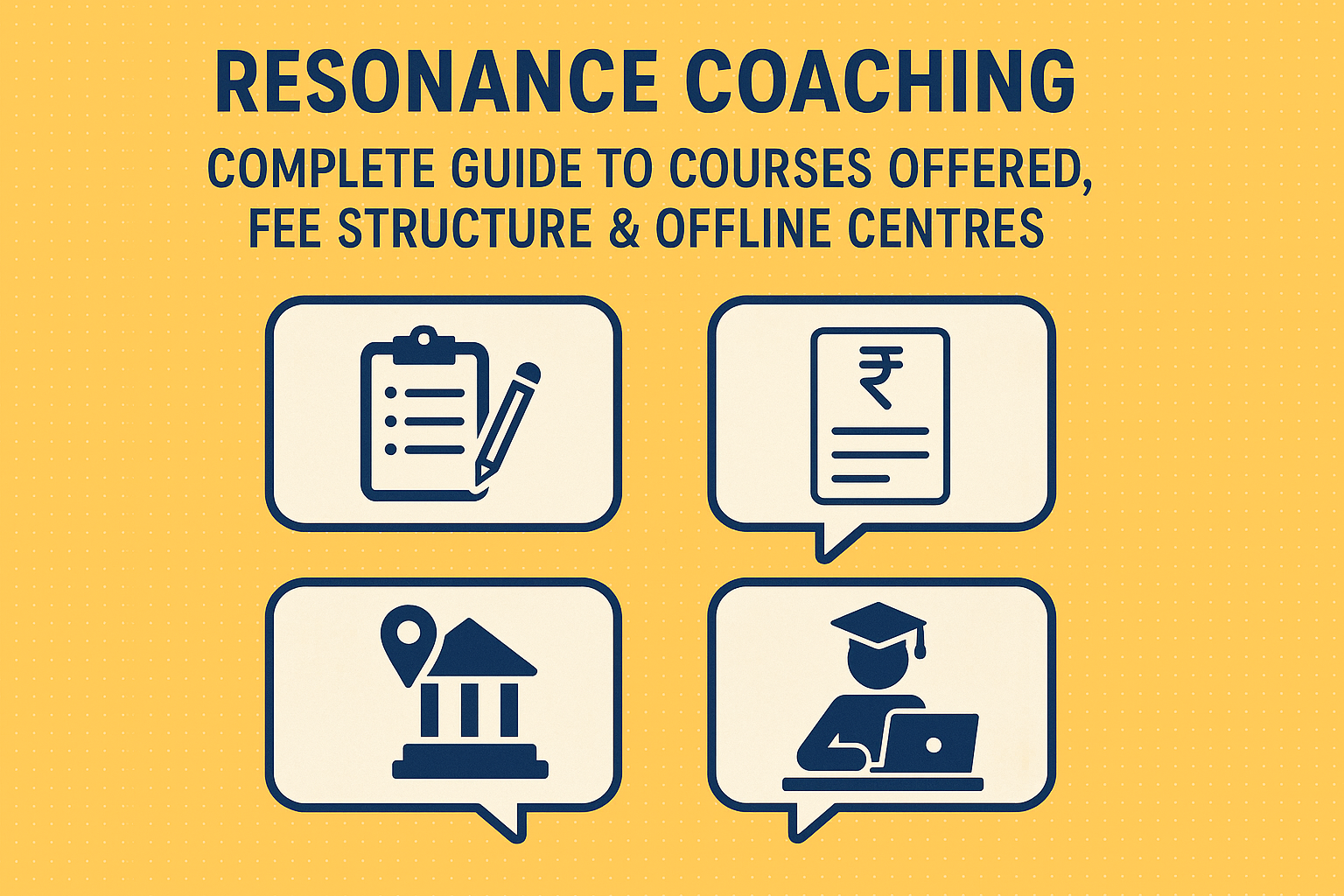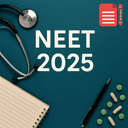
What is Resonance Coaching
Resonance Eduventures Ltd is a major coaching institute in India, known especially for preparing students for engineering (JEE Main + Advanced) and medical (NEET / AIIMS) entrance exams. Besides those, they also run courses for olympiads / school boards / talent tests. They have both classroom (offline) and online / hybrid formats, with many study centres across India.
Courses Offered by Resonance
Here’s a breakdown of the main types of courses and programs:
| Classes V to X (and “moving” from one class to next) | Olympiads / NTSE / foundation for JEE / NEET later | Year-long classroom / weekend programs |
| Class XI & XII (or “11-12 moving”) | JEE Main + Advanced, NEET / AIIMS | 1-year / 2-year classroom or integrated programs |
| “XII passing / passed” | For students who’ve completed 12th and want crash / revision / gap-year style prep | Shorter duration / crash courses |
| Online / Hybrid Courses | Same exams (JEE / NEET etc.), for students who can’t attend offline, or need flexible schedule | Live classes, recorded lectures, online test series, doubt sessions etc. |
| Special / Weekend / Part-time programs | Supplementary coaching, weekend classes, subject-wise modules, specific short durations | 9-month, 6-month etc. |
Also relevant are test series, study materials, periodic assessments, doubt-clearing etc., which are integral parts of most of their programs.
Fee Structure (2025-26) – What It Looks Like
Fees vary depending on course, duration, whether you are in Kota or a satellite study centre, whether it’s a full-year / multi-year program, etc. Here are some sample fee ranges and key points:
- For a 1-year JEE Advanced classroom program: fees are typically between ₹30,000 and ₹85,000 depending on level, target class (XI, XII) etc.
- At many centres (outside main Kota centre), fees are somewhat higher for multi-year or intensive programs. For example, in some satellite centres, 2-year JEE + week-end/weekday programs may cost ₹2,60,000 or more.
- For online / hybrid programs or “passing class XII” crash courses, the fees tend to be lower than full classroom programs, but still substantial (depending on what’s included: lectures, tests, materials). (Exact amounts vary by centre.)
- Some cities like Lucknow have specific fee packages: e.g. for a “Class 12 Pass / 1 Year Online” program, Resonance Lucknow lists ~ ₹66,000 (lump-sum) or ~ ₹70,000 in two instalments.
Additional Fee Components
- GST: The course fees are subject to GST (currently ~18%) wherever applicable.
- Caution Money / Deposit: A refundable or partly refundable deposit (sometimes called “caution money”) is charged by many study centres.
- Study Material, Admission Packet: Often included or separately charged; the cost of admission packet may be in addition.
- Installments: Many of the full-year or multi-year classroom courses allow fee payment in 2 or 3 instalments. Late fees / penalties may apply for delayed payment.
Offline Centres / Study Centres & Geographical Reach — Resonance (thorough guide)
1) Snapshot — Resonance’s pan-India network
Resonance runs a large, pan-India network made up of its flagship/central campuses, regional study centres, local (satellite/affiliate) study centres and separate offices for distance/DLP delivery and test centres. The company publishes a network / centre map and an official list you can consult to find the nearest centre.
2) The different kinds of offline centres (and what each actually means)
- Flagship / Kota campus (Head / Corporate campus)
- The Kota campus(s) are Resonance’s largest, most resourced centres — multiple buildings, sizeable faculty teams, dedicated in-house test infrastructure, large hostel tie-ups, and a dense peer ecosystem. If you study in Kota you’ll usually get the broadest on-campus services (regular mocks, counselling, large batch options).
- Regional Study Centres (official Resonance centres in major cities)
- These are company-run centres in important cities (e.g., Jaipur, Lucknow, Hyderabad, Patna, etc.). They follow Resonance’s curriculum, deliver classroom lectures, conduct periodic tests and counselling, and are staffed by Resonance faculty or trained local faculty. Use the official study-centres list to find city-wise addresses and contacts.
- Satellite / Franchise / Local partner centres
- In many smaller cities Resonance operates via partner or franchise study centres. These offer standard Resonance material and classes but can vary in batch size, local faculty, and infrastructure. (That’s why local verification is important.)
- DLP / PCCP / Test Centers and Admin Offices
- Resonance also lists separate addresses for DLP/PCCP (distance learning / printed content) offices and designated test centres — these handle online / printed study material distribution and offline exam administration. For many students in smaller towns, the local center acts as the pickup / test hub.
3) What an offline centre typically provides (expectations vs reality)
Most genuine Resonance offline centres provide these building blocks — check each item when you visit:
- Classroom lectures (regular schedule; recorded or live)
- Periodic test series / full syllabus mocks and answer discussions
- Printed / digital study material aligned to Reso’s curriculum
- Doubt-clearing sessions and small batch doubt clinics
- Counselling & performance feedback (monthly/quarterly)
- Access to recorded lectures / e-resources (varies centre to centre)
- Basic campus facilities — library, computer lab for tests/assignments (larger centres like Kota will have better infrastructure).
4) Key differences: Kota flagship vs Regional vs Local satellite
- Faculty & depth: Kota flagship usually has the largest pool of experienced subject experts and visiting toppers; regional centres may have a mix of Resonance faculty + trained local staff; satellite centres often rely more on local faculty.
- Infrastructure: Kota & major regional centres have bigger lecture halls, dedicated test labs and libraries. Small satellite centres may have compact classrooms and limited lab/test infrastructure.
- Peer environment: Kota draws thousands of serious aspirants — higher competition and peer motivation. Regional centres are less intense but still structured.
- Course availability: Some niche programs or very specialized short-term crash courses may be offered only at flagship or selected regional centres.
- Fees & extras: Fees — and extras like hostel tie-ups, weekend workshops, and counselling hours — vary by centre. Typically the offering breadth (and hence the fee) grows with centre size/importance.
5) How geography affects your experience (practical consequences)
- Access to toppers/mentors — easier in Kota/major centres.
- Mock test quality & frequency — typically more frequent and better proctored at larger centres.
- Hostel & local ecosystem cost — Kota hostels and living costs are a separate expense; in some cities, staying local is cheaper but may lack full-time counselling.
- Admission competition — batches in Kota can be more competitive; in smaller cities you might get smaller batches with more individual attention.
6) How to verify a specific Resonance centre (step-by-step checklist)
- Find the centre on Resonance’s official list / network map — confirm the address & phone. Call the centre on the official number (ask for demo class dates, faculty roster and fee breakup). Use the contact page if in doubt.
- Visit for a demo lecture — watch teaching style, batch size, student engagement, classroom infrastructure.
- Ask for the written fee breakup — tuition, study material, test fees, GST, deposits, instalment options and late fee rules.
- Check who will teach your subject — permanent Resonance faculty or local hires? Ask for teacher profiles.
- Ask about recorded lectures / online access — if you miss a class, can you access recording? Is it centre-specific?
- Talk to current students / alumni — their experience on doubt resolution, test quality, counselling. Look at local reviews on forums / Justdial / Google.
- Get refund / transfer policy in writing — important if you shift cities or need to switch to online.
- Confirm hostel arrangements (if needed) — if the centre helps with hostel, ask about inspection, mess menu & security.
- Resonance’s official study-centres / DLP addresses and contact list (use this first to verify centre authenticity).
- Corporate / head office and Kota campus contact details are on the official site. Use those numbers if you can’t reach a local centre.
8) Real-world tips & red flags
Do this: get a written schedule (class timings, test dates), ask for demo class and try one full test; compare two or three local centres.
Red flags: no demo offered, vague fee breakup, no written refund policy, unclear faculty assignments, or centre not listed on the official Resonance network map. If any of those appear, call the corporate contact and confirm.
9) Short FAQ (practical answers)
- Can you switch between centres (e.g., move from hometown centre to Kota)?
- Usually possible — but ask about transfer policy, fee adjustment and record access (recorded lectures). Get it in writing.
- Does every centre run the same test series?
- Core test series is standard, but frequency/proctoring may differ by centre. Larger centres run more frequent full-length mocks.
- Are scholarships / concessions centre-specific?
- Scholarship tests and concessions are often announced centrally but some local offers/discounts may be centre-level. Confirm with the centre.
Things to Check / Know Before Enrolling
To make an informed decision, consider these:
- Course variant: Is it full-year, crash, 2-year, weekend/weekday, online/offline? That hugely affects cost and study load.
- Centre location: Fees & facilities differ by city; also whether you’ll need hostel or travel accommodations.
- Scholarships / Concessions: Resonance sometimes offers scholarship programs, performance-linked rewards, etc., depending on past academic performance or test results. It’s worth checking if you’re eligible.
- Support material, test series, doubt classes: Make sure what is included in the fee (lectures, tests, printed/online study material, mocks, counseling).
- Payment terms: How many installments, late fees, deposit etc.
- Refund / cancellation policy: Especially for online or hybrid courses, or if you change centres / drop out.
- Past results / reputation of that specific centre (not just of Resonance globally), since local faculty and infrastructure matter.
Sample Fee Examples (2025-26)
To give more concrete numbers:
- A 1-year Classroom Contact Program (JEE Advanced) in some study centres can be ₹30,000-₹85,000 depending on class, target year etc.
- Resonance Lucknow: “Class 12 Pass / Online / 1 Year” ~ ₹66,000 (lump-sum) or ~ ₹70,000 in 2 instalments.
- Agra centre: A one-year “Vikaas” classroom IIT-JEE Advanced program (weekday) from Agra centre is listed from ~ ₹71,000 onwards. A 2-year weekend class program is ~ ₹2,60,000.


















